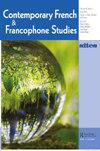Derrida and Translation in China
IF 0.2
4区 文学
0 LITERATURE, ROMANCE
引用次数: 0
Abstract
Abstract Derrida has provided food for thought for translation scholars to further explore some of the fundamental questions about translation. He emphasizes the crucial role of context and the movement of recontextualization in relation to translation. Multiple contexts are involved in translation, resulting in multiple recontextualizations. In this process, the connections between signifiers and signifieds are constantly re-established. As contexts change, meaning becomes more fluid and the possibilities offered by meaning, in general, are expanded as new contexts are created through the act of translation. Deconstructing conceptualizations of multiple contexts with particular reference to issues of textual interpretation prompts further investigation of the underlying contradictions and paradoxes in theorizing translation. One of the most common outcomes of translation is a tendency toward explicitness. The fundamental and inescapable dilemma between necessity and impossibility in which translation finds itself points to its thankless and frustrating nature. Translation requires at least a temporary separation of signifier and signified. If the former is replaced in the target text, the question inevitably arises as to how the latter can remain largely unchanged, as is the case in the traditional view of translation. Deconstruction in relation to translation is still contentious in China. Its usefulness is less questionable and less often dismissed as bunkum, and its obscurity still troubles translation scholars. However, deconstruction will once again be relevant to Translation Studies thanks to the renewed interest in world literature in China, which foregrounds aesthetic and cultural untranslatability. Many of Derrida’s insights will continue to shed light on the complexity of understanding translation and its central role in promoting intercultural dialogue.德里达与中国的翻译
摘要 德里达为翻译学者进一步探讨有关翻译的一些基本问题提供了思考的食粮。他强调语境和再语境化运动在翻译中的关键作用。翻译涉及多重语境,从而产生多重再语境化。在这一过程中,符号和被符号之间的联系不断重新建立。随着语境的变化,意义变得更加多变,意义所提供的可能性也随着翻译行为所创造的新语境而普遍扩大。对多重语境概念的解构,特别是对文本解释问题的解构,促使我们进一步研究翻译理论化过程中的潜在矛盾和悖论。翻译最常见的结果之一是趋向明确性。翻译本身所处的必要性与不可能性之间根本性的、无法回避的两难境地表明了翻译的吃力不讨好和令人沮丧的性质。翻译至少需要暂时分离符号和被符号。如果前者在目标文本中被取代,那么不可避免地会出现这样的问题,即后者如何能像传统翻译观中那样保持基本不变。与翻译有关的解构主义在中国仍有争议。解构主义的实用性较少受到质疑,也较少被视为无稽之谈,其模糊性仍然困扰着翻译学者。然而,由于中国对世界文学的重新关注,解构主义将再次与翻译研究相关,因为世界文学强调美学和文化的不可译性。德里达的许多见解将继续揭示理解翻译的复杂性及其在促进文化间对话中的核心作用。
本文章由计算机程序翻译,如有差异,请以英文原文为准。
求助全文
约1分钟内获得全文
求助全文
来源期刊

Contemporary French and Francophone Studies
LITERATURE, ROMANCE-
CiteScore
0.30
自引率
0.00%
发文量
43
期刊介绍:
An established journal of reference inviting all critical approaches on the latest debates and issues in the field, Contemporary French & Francophone Studies (formerly known as SITES) provides a forum not only for academics, but for novelists, poets, artists, journalists, and filmmakers as well. In addition to its focus on French and Francophone studies, one of the journal"s primary objectives is to reflect the interdisciplinary direction taken by the field and by the humanities and the arts in general. CF&FS is published five times per year, with four issues devoted to particular themes, and a fifth issue, “The Open Issue” welcoming non-thematic contributions.
 求助内容:
求助内容: 应助结果提醒方式:
应助结果提醒方式:


